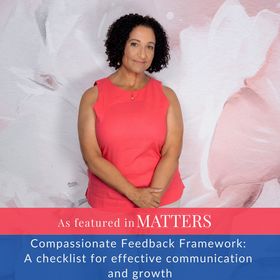
BY SHARI HALL
ORIGINALLY PUBLISHED BY MATTERS MAGAZINE
On a normal Thursday morning at the office, I was greeted by several of my colleagues. Each had a smile on their face and a delightful story to share as they entered my cubicle to say “G’day!” One meeting was scheduled on the calendar, so I expected the day to breeze by easily.
Shortly before that meeting, I was informed by email that it would now be held with a high-level executive from the company, not the department head, as originally planned. While curious about the sudden change, I had no concerns until I asked for an agenda, and none was provided.
The meeting occurred in a private room at the workplace, with only me and the executive present. At first, it appeared to be an informal conversation meant to ‘check in’ on my wellbeing, my demanding workload, and a review of concerns I’d recently raised. Sadly, this is not what transpired. Rather, it was a 75-minute interrogation regarding alleged complaints and reports about me, my behaviour and my professionalism in the workplace.
The information presented was unsubstantiated, non-specific in nature, out of context, and grossly exaggerated. As the minutes wore on, I felt increasingly intimidated, anxious, and threatened, a stark contrast to the supportive and growth-oriented environment I had come to know and love over the years.
To say I was traumatised was an understatement. The executive had painted a picture that was the antithesis of the reality of my work environment and who I knew myself to be.
After I lodged an incident report about the meeting, the company and a government agency investigated.
It was determined that while the executive acted with reasonable management action, he did it in an ‘unreasonable way.’ While the intention of the meeting may have been to show genuine concern for my wellbeing, the way it was delivered resulted in devastating effects for both parties.
If you’ve ever been on the receiving end of poorly delivered feedback, you’ll understand why the ability to provide honest, compassionate, detailed, and actionable feedback is paramount for fostering growth and development in any business or organisation. Constructive feedback not only enhances individual performance but also contributes to the overall success of the company.
Many bosses use what has been described as ‘old-school tactics.’ These outdated methods have several negative outcomes: demotivation over motivation, erosion of trust, and, ultimately, long-term disengagement. When intimidation, embarrassing methods (like naming and shaming), and threatening tactics are used, employees are more likely to become defensive, feel demoralised, and be unreceptive to future constructive feedback. There may even be long-term mental health implications.
Giving and receiving feedback is a part of living. From infancy, when parents start saying ‘no’, to childhood, when teachers start assessing schoolwork, to adulthood, when family, friends and employers all seem to have something to say about who you are, what you do, and how you behave - it’s a fact of life. It can be done better, though. This incident was one I would never forget; however, as a result, I created the ‘Compassionate FEEDBACK Framework’, which I hope and believe will, if used, produce a better outcome than the one I had.
By following this framework, business owners can create a culture of trust, growth, and continuous improvement within their organisation. This approach will not only enhance individual performance but also contribute to the overall success of the organisation, fostering a positive and supportive environment where everyone feels valued and motivated to grow.
-(2).png)
Leave Comment Below